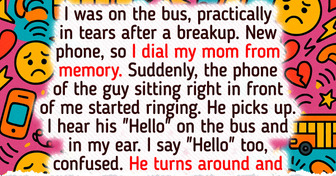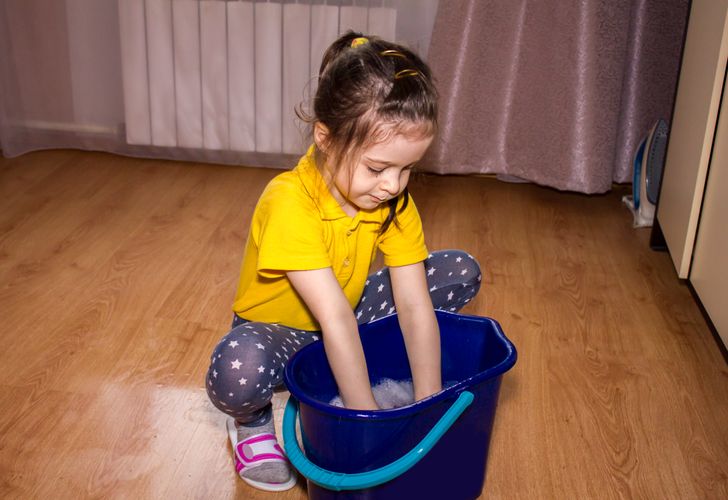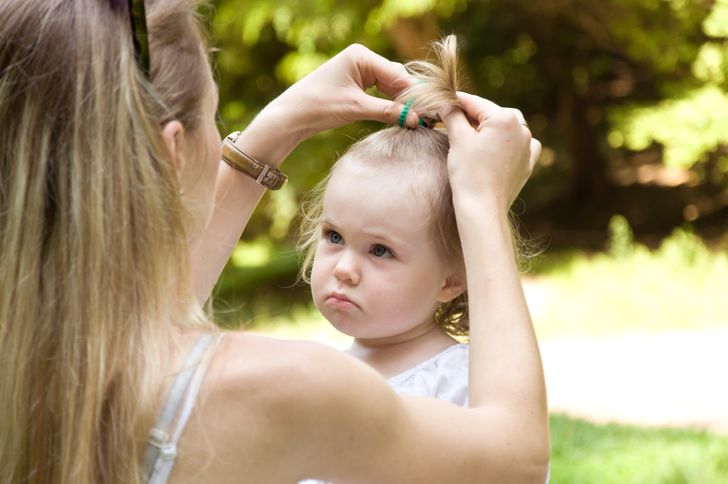15 Seemingly Harmless Phrases From Parents That Can Echo Into Their Kids’ Future
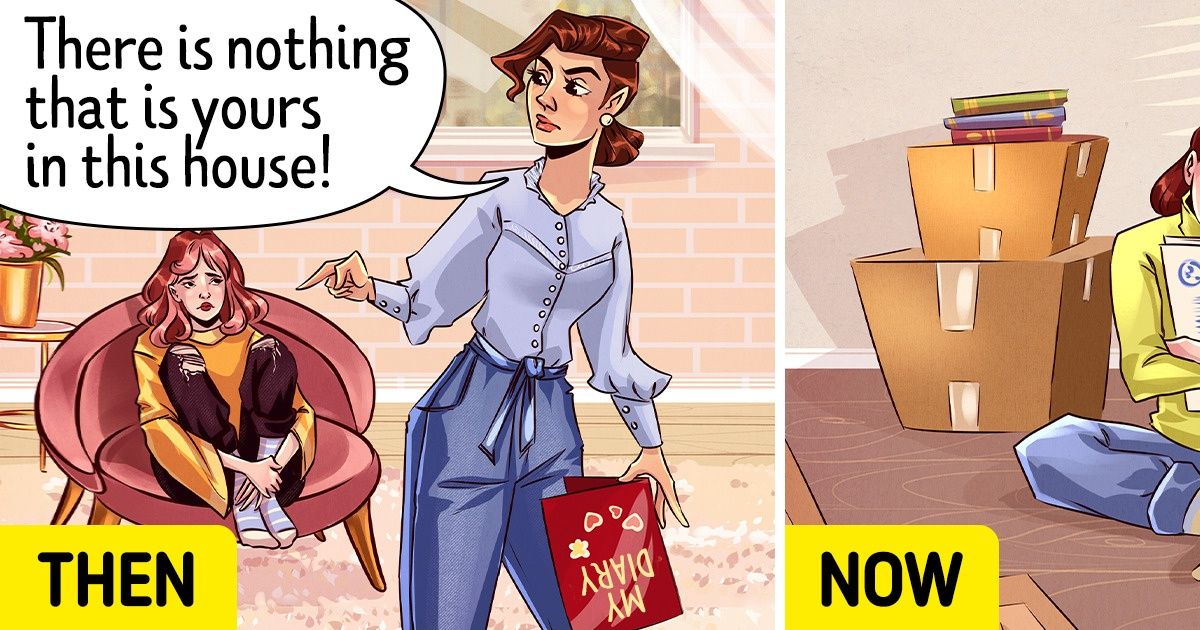
The road to our beloved psychotherapists is paved with the good intentions of our parents. In most cases, our mothers and fathers really only wanted the best for us but still, many years later, their adult kids struggle to overcome the consequences of their upbringing. Moreover, a part of them repeats the mistakes of their parents who said the same phrases to their kids that a while back had also been hurt by the same rhetoric.
We at Bright Side collected the phrases and statements that hurt today’s adults most of all, in order to figure out how much these seemingly harmless words affected their lives.
“There is nothing that is yours in this house!”
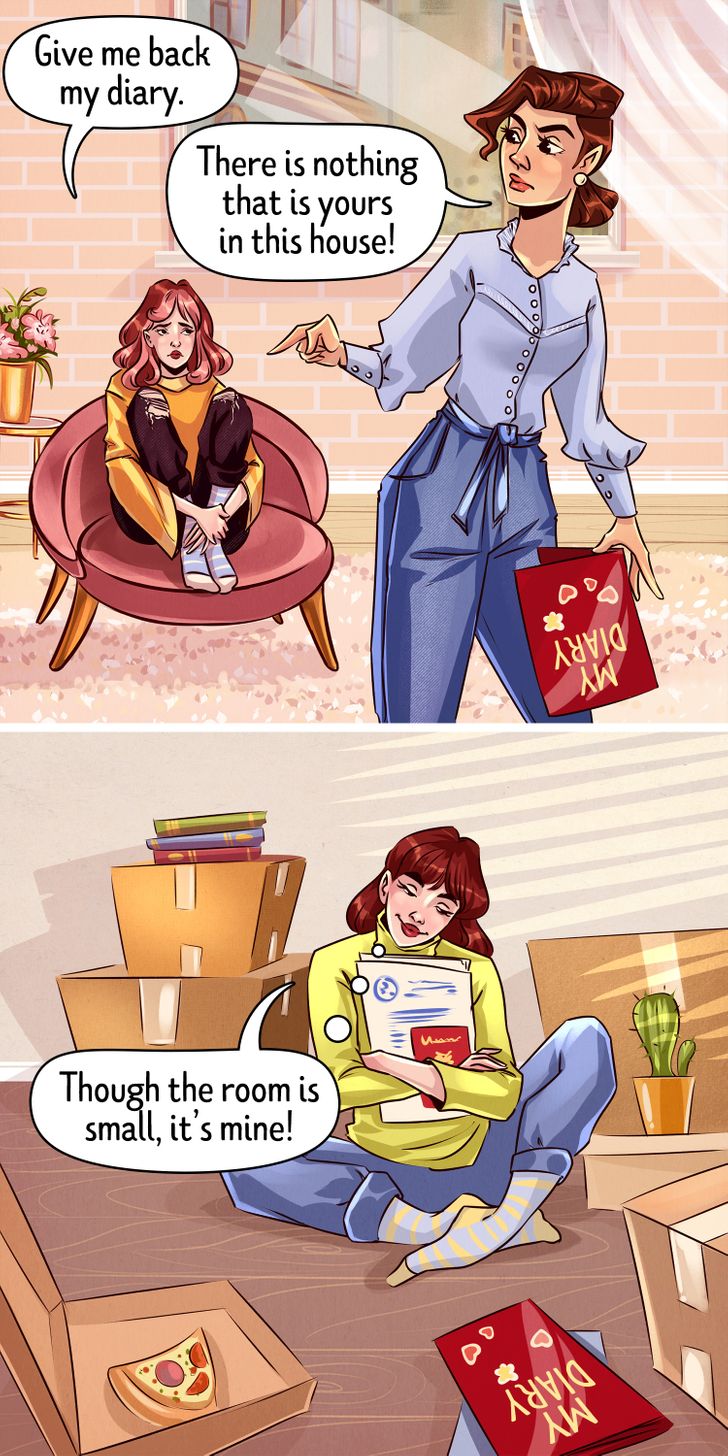
Some parents are convinced that a child doesn’t have their own personality until they are able to financially provide for themselves. This means that, before this moment, they might ignore the kid’s opinion, feelings, and special needs. The toxic idea that a person is nobody until they start to earn money themselves, raises a generation of notorious workaholics.
Kids who, from their childhood, have absorbed the thought that nothing in their parents’ home belongs to them, and who never feel secure. Lost childhood, depression, anxiety, an exhausting feeling of guilt and shame, as well as low self-esteem — these are just some of the frequent consequences of this kind of upbringing.
A parental attitude like this will motivate a teenager to want to quickly move away from mom and dad in order to finally have their own little world, with at least some kind of stability, even if it’s a room in a dorm that is the illusion of their “own” place. As a rule, these people work a lot because that’s the only way for them to feel significant.
- Me: “Mom, can you please knock before entering my room? The absence of my own personal space is one of the reasons for my constant anxiety.” Mom: “What do you mean? It’s my apartment! Should I move out in order to not disturb your personal space at all!?” © sviatayalojka / Twitter
- “You don’t have anything that is yours. Even you yourself are made out of me. You haven’t earned a penny, but pretend to be a person with a personality.” This phrase followed me from age 5 to 18. I can’t rest, I am dreadfully afraid to lose or change jobs because it might require a small break in earnings. I also have difficulties with expressing my emotions aloud. © Kseniya Gerasimyak / Yandex Zen
“Stay out of adult conversations.”
For many parents, their child will always be a foolish kid and it doesn’t matter how old their offspring is (5,15, or 50). It seems to them that their child is not able to have serious conversations with adults and that it is too early for them to have their own point of view on anything. These parents don’t consider their children to be individuals, and their children feel it fully.
After many years it can echo in the fact that the grown-up kid will feel shy about expressing their opinion in the presence of adults (teachers, bosses) and will think that their thoughts are insignificant and don’t deserve any attention. It will prevent the kid from unfolding their talents in their studies, as well as building a successful career.
- My mother adored this phrase. For example, when a friend of hers was visiting us and they started to reminisce about an interesting movie that I had also watched and was willing to discuss, she would say, “Don’t get into the conversation of adults!” Once one of her friends said, “Why are you shutting her out? Let her speak” and the reply was the following, “She shouldn’t interfere when adults are speaking.” At that point, I was a teenager and in this phrase, I heard, “Don’t even try, you’re silly and don’t understand anything.” © Kaoma777 / AdMe
“If I don’t remember it, it means it didn’t happen.”
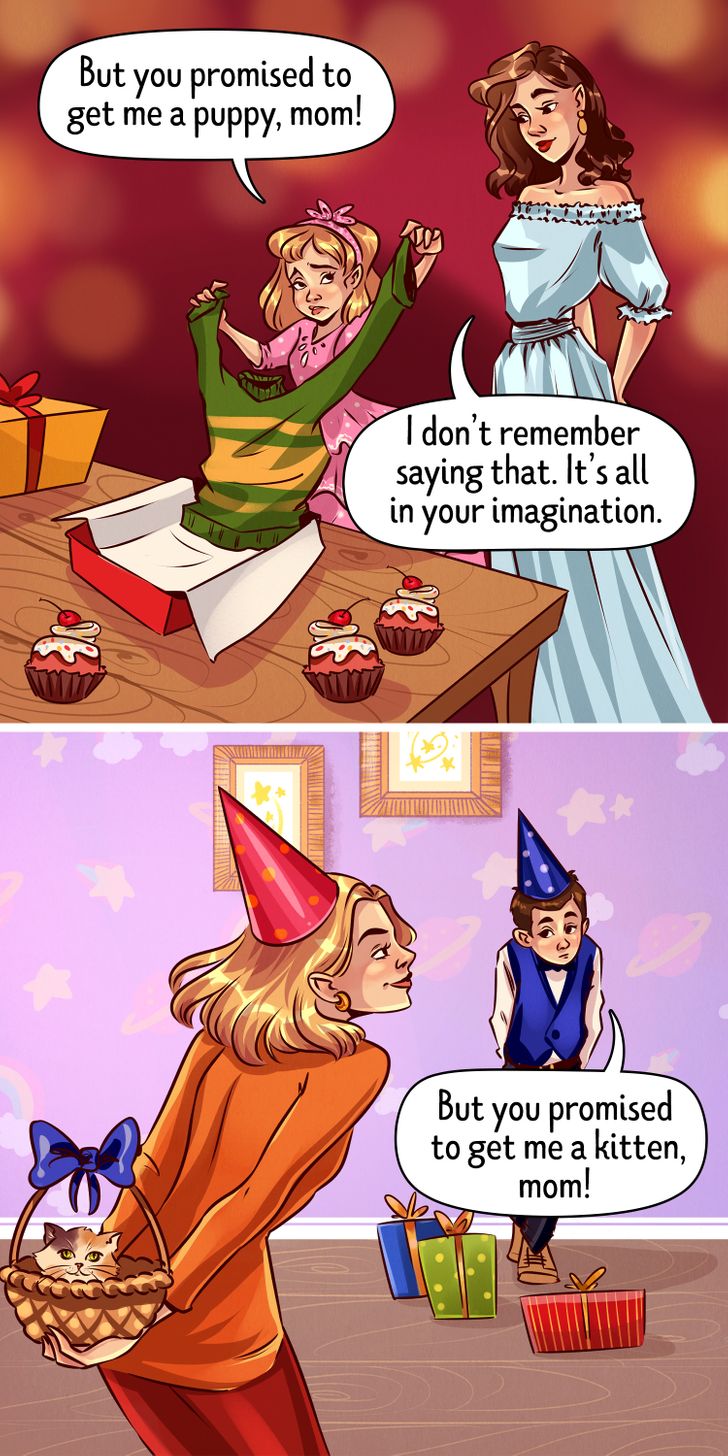
Today many of us know about gaslighting and understand that the denial of real events is a form of psychological violence. But in childhood, many of us heard the phrase, “It’s all in your imagination! It never happened!” from our parents, who didn’t want to admit their mistakes.
As a result, children start to doubt the adequacy of their perception of reality and the usefulness of their own memory. It negatively affects their ability to trust themselves and the world because even their parents keep showing them that something is wrong with them because they remember things that in fact “never happened.”
- I was working with a client whose mother kicked her out onto the staircase in her underwear at the age of 13, saying, “Get out of here, you own nothing in this house!” Why? Because the girl dared to say to her, “This is my home too!” The neighbors let the girl wait in their home until her mom’s tantrum was over. When the daughter tried to remind her mother about this, she said, “It couldn’t have happened. I wouldn’t be able to look into our neighbors’ eyes. You are making it all up!” © lfeey / Pikabu
“You shouldn’t offend girls.”
This might seem to be a correct piece of advice — a real man should protect the representatives of the weaker half of the planet, help them, and concede to them. Everything goes well until the moment girls start to use their privileges to take advantage of boys or misbehave. While a well-brought-up boy has to just stand there and take the teasing from his female peers.
Eventually, they grow into men who are simply afraid of women and they can’t give a verbal rebuff even in cases where the women are crossing all the lines. That’s when a guideline that was supposed to prevent violence relating to one type of people, leads to the appearance of socially-approved violence over others. Men, in this case, feel shy to even make a claim or confront it.
-
“You shouldn’t offend girls!” Is the freakiest and silliest phrase that has become very popular among the parents of boys. It means some bold girl can hit a boy in the head, tear his book, troll him in social media, and she won’t get in trouble for it! Because she is a gi-i-i-i-i-rl! © Evgeniya Yavuz-Ponomareva / Facebook
“You ruin everything.”
Few people can do something well, that is completely new to them, from the first or even the second try. We require experience, skills, and habits. Making mistakes is totally normal, especially in childhood. It’s not normal to transfer all the responsibility to a kid for their mistakes. After all, if parents haven’t taught their offspring something, that’s not the kid’s fault.
Over time, a small child who regularly hears these words directed at them will stop trying to do anything in order to not be guilty. Moreover, a child may start to consider themselves the source of all the problems of their parents, and they might believe they are not good enough and don’t deserve love or the right to live.
- There is a vending machine in our mall where people can grab a toy with the help of a joystick. Yesterday a mother and her approximately 4-year-old son went up to it, she was moving the joystick, he was getting ready to push the button to get a toy with the help of a special catcher. When he pressed it, he failed to catch the toy and the mother started to scream, “You always spoil everything!” Poor child! © RukaLizo / Pikabu
“You can do better.”
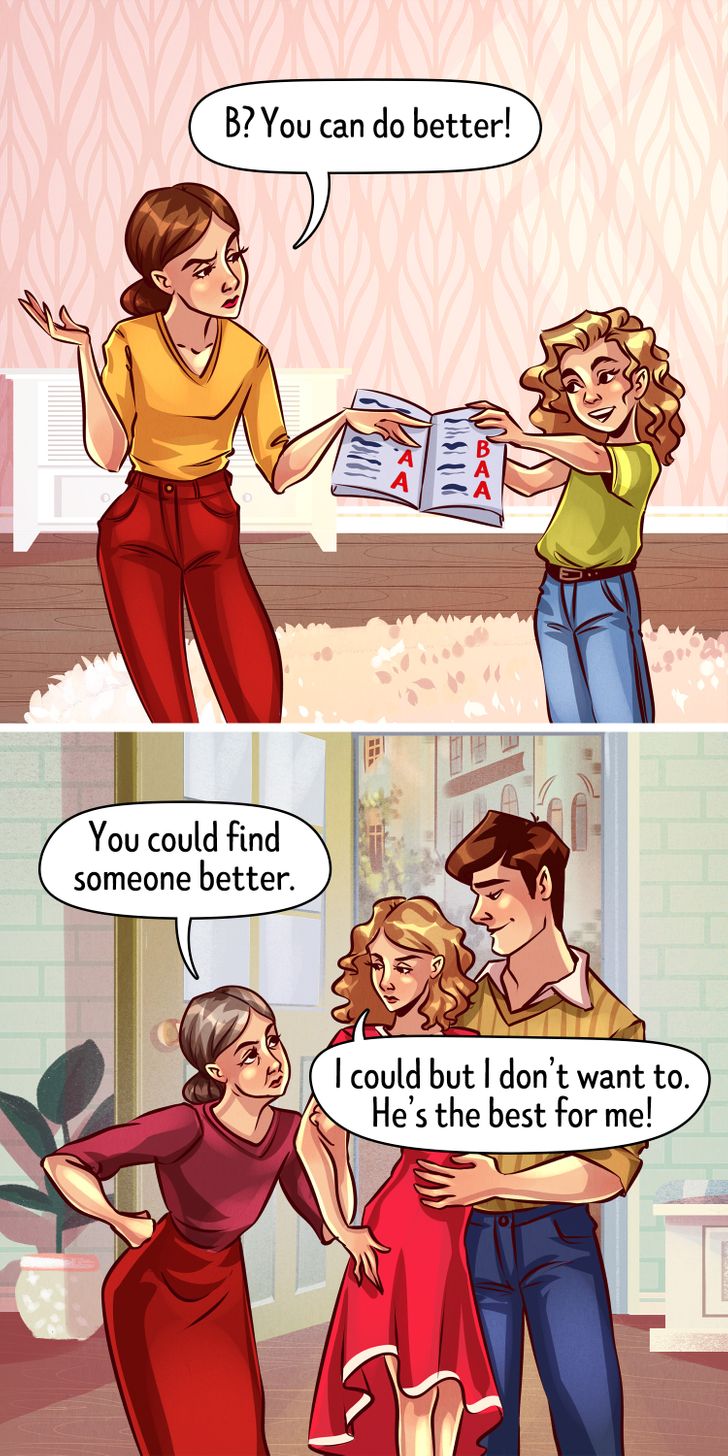
There is always room for improvement but many parents think differently. From their very first steps, they give unreachable tasks to their offspring and kids have to jump through a bunch of hoops to complete them. At the same time, adults often forget to reward their kids for their achievements because it’s not a reason to feel proud but just a signal that it’s time to up the goals.
A kid who lives in the eternal race for the parental ideal doesn’t know how to value themselves and enjoy the process of their work. And, of course, it will be difficult for them to avoid neurosis and stresses because there is always something ahead they have to strive for. These kids are often sick and they often procrastinate and go off track, having gotten tired of whirling in the wheel of someone else’s ambitions.
- My friend’s mother would always say to her, “You could’ve done better.” She never praised her for the results. My friend could never feel happy about her achievements or even small victories. Because “she could do it better.” Later, she somehow managed to overcome it and started to understand that if she did something well, it was true and she should feel happy about it. Whether she could do it better and whether she should do it are 2 totally different questions. © Irmali / AdMe
- All my life I would try to do anything to deserve praise. I hardly ever heard a simple, “Good job.” I always saw the usual indifferent reactions or fault-findings. Eventually, I grew up into a reserved lazy bones, who hardly ever communicates with anyone because what’s the point of doing something or speaking about it if no one will appreciate it? © kaddyd / Pikabu
“You’ll manage somehow.”
This phrase has many versions: from “You’ll manage somehow” to “You want too much.” Their meaning boils down to the fact that the child should forget about their dreams and desires — not because they are unrealizable, but rather because the parents don’t consider it necessary to fulfill them.
Over time, kids simply stop dreaming because they understand that it will never come true. They know that instead of a long-cherished doll under the Christmas tree, they will get a sweater (usually in a bigger size, so that it lasts longer) and instead of having a snack outside, the mother will say, “Is there nothing to eat at home?” (even if there are no financial issues in the family). Why? “Because I decided so — that’s why!”
- I was always told “keep dreaming” in response to any request (not necessarily about a purchase) and “it doesn’t matter much, put up with it” in response to my claims about some kind of discomfort. Now I am putting up with a lot of things and I have problems with personal borders. © saasshhha / Twitter
“You are older!”
When smaller kids appear in the family, older kids often have to grow up faster. In parents’ eyes, they lose the right to be little kids, even if the difference in age is not that big. A certain responsibility is assigned to them: to become wiser and more independent. And it doesn’t matter that the kids might only be 2-3 years old at that moment.
Early and forced growing up is not good for anyone. Yes, this kid might be more adjusted to life and they might achieve a lot, but the price for this success will be a lost childhood and subconscious anger at parents and younger siblings. It doesn’t contribute to warm family relationships in any way and is often a psychological obstacle to creating their own family.
- All my childhood I kept hearing the phrase “You are older!” Afterward, I was supposed to give away my favorite book, toys, or candy, and forget about my interests to watch my younger twin sisters. The older I was becoming, the more my list grew of things I had to do. Clean the entire apartment, cook, help my siblings with their homework. At the age of 19, I moved out. Today I only keep in touch with my parents and I don’t talk to them very often. The age difference between me and my younger sisters is 1 year and 10 months. © Overheard / Vk
“You’re doing it all wrong. I’d better do it myself.”
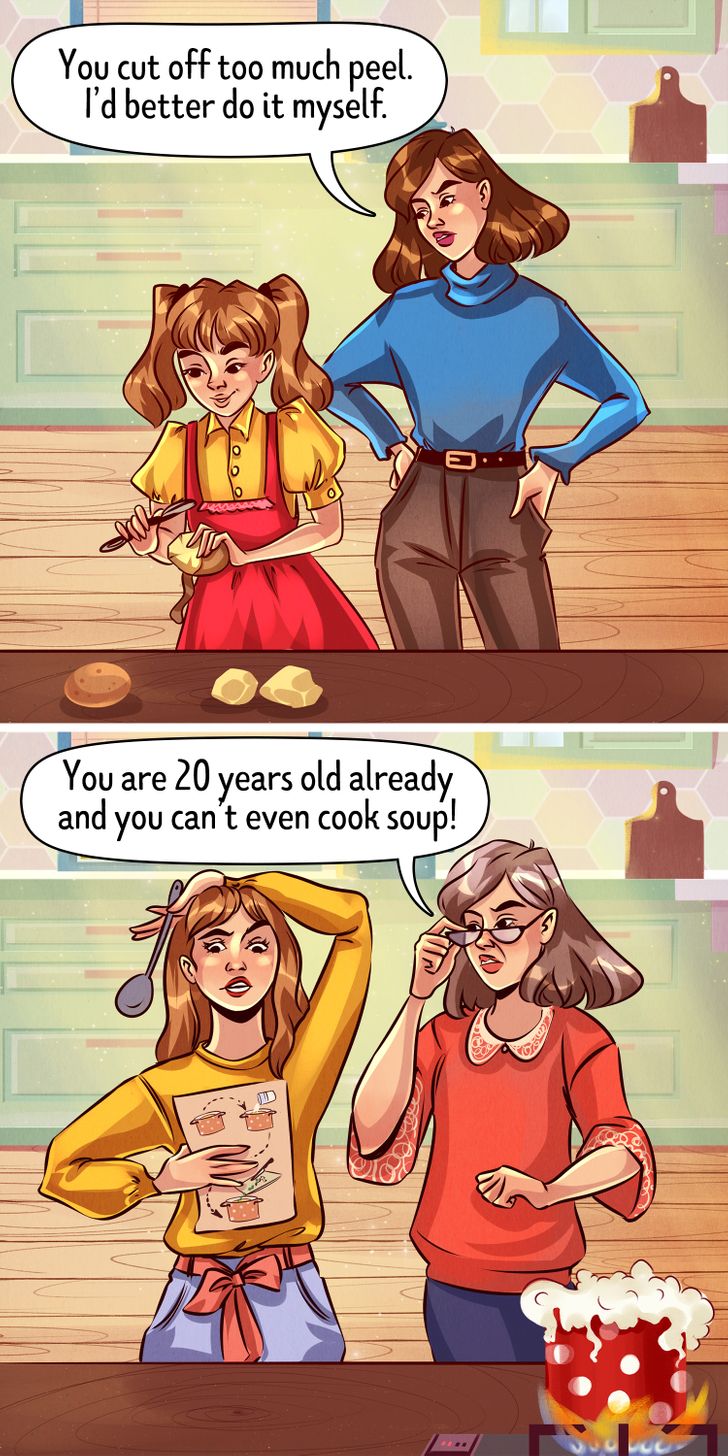
No one is born with cooking skills, or knowing how to wash and iron a shirt: everything comes with experience that shapes up from trial and error. Oftentimes, it’s easier for parents to do something by themselves, rather than teach their kid to do it. A parent might think that, if they stop to teach, it will take more time, the child will make mistakes, or they might even have to do everything all over again by themselves anyway.
While trying to protect their child from unnecessary worry, many parents forget that household chores are an important part of their child’s upbringing. This work helps with the development of self-control and self-discipline (after all, it is silly to litter where you yourself will then have to clean up the floor), and both of these qualities will definitely be useful for children over the course of their lives.
Kids whose parents don’t give them a chance to learn together from their mistakes feel household disabled later in adulthood: they feel scared to do something new and don’t believe in themselves.
- In childhood, my mom scolded me for peeling off too much skin from the potatoes and said I’d better not do it at all. Or after vacuum cleaning the house, I was waiting for praise, but instead, I heard that I had missed something or that there was some dirt left in the corner. It was all finished off by her saying something like, it’s better to not do anything at all, than to do it poorly. Needless to say that at the age of 17, when I started to live in a dorm, I couldn’t even fry pre-cooked cutlets. The good thing is that life eventually taught me how to do these things. © ankaka / Pikabu
“You won’t achieve anything in life.”
Parents who don’t believe in their kids affect their kids’ self-esteem greatly, “Who will believe in me if my parents think I am not capable of anything?” If you keep imposing these thoughts on kids on a regular basis, they will learn the main point, “Something is wrong with me.” In order to overcome this feeling, many people require years of serious therapy.
In adulthood, kids whose parents didn’t believe in them oftentimes behave in the opposite way: they either give up in advance without trying to achieve anything (because they are programmed for failure) or they dedicate their whole life to proving to their parents that they were wrong.
- “You’ll achieve nothing, you have no talent at all, while Jane from the neighboring house is such a smart girl...” As a result, I had a big bunch of complexes by the time I was 22 years old. I graduated from college with honors, but before that, I kept hearing, “You won’t be able to even get enrolled in that college.” I got enrolled in all specializations I submitted my documents to, but chose the most difficult one despite everyone’s saying, “You won’t be able to last there for even one year.” The list goes on... © alicep / Pikabu
- Most of all, I remember my mom saying, “Come on, don’t even dream about that! You’ll marry some locksmith and that’ll do.” Maybe that’s the reason why I did my best, kept studying, and found the partner of my dreams. I am happy! © Natalia Galkina (Holkina) / Yandex Zen
“These are your own problems and it’s you who has to solve them.”
Raising a kid using the method, “Trust no one, fear no one, ask for nothing” has its advantages and disadvantages. On one hand, a kid should be taught to cope with difficulties by themselves — it’s an important skill that will be helpful in life. But parents should also understand that due to a lack of life experience, kids simply can’t (and shouldn’t) have to deal with some issues by themselves.
If a parent doesn’t give the child the proper support that they feel they can rely on in difficult times, the kid has every chance of getting into trouble. The feeling of security and trust is as necessary for children as independence is, so the main thing for adults to remember is to not go too far into this matter.
- I was always taught to not complain and to rely only on myself. I remember saying to my mom that my arm hurt a lot. I had to go to the hospital by myself to get an exam. When my mom came home from work, she found me with a cast on my arm. “Mom, I told you it hurt. I have a crack in the bone of my arm.” My husband has worked really hard to make me start telling him what exactly in my body hurts and how my treatment is going. That’s why now that we have 3 kids, I examine them, treat them, and pay attention to any complaints. © Guzik Lena / Facebook
“Are you reading books? Do something useful.”
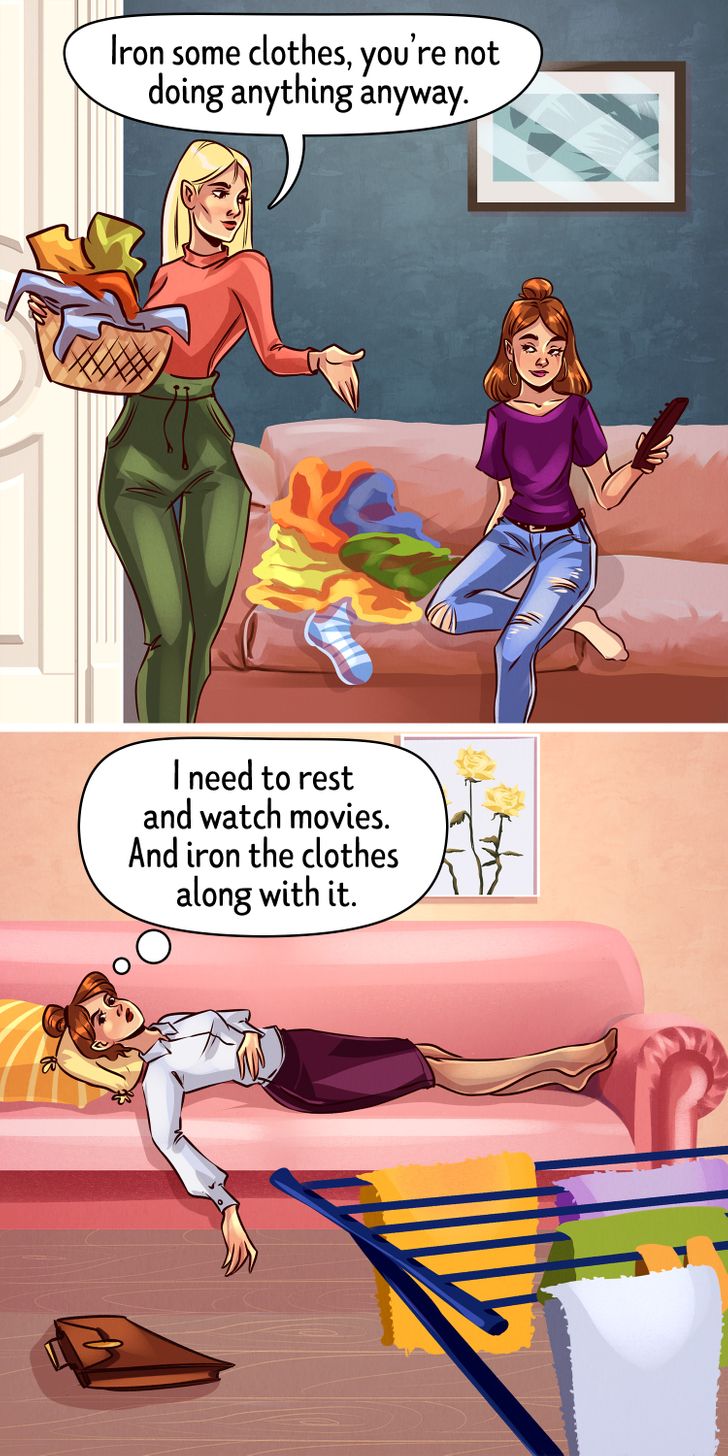
Many parents sincerely believe that a kid should always be doing something useful, like doing homework, doing extra-curricular activities, or cleaning their room. Daydreaming or reading a book seems to be something to be ashamed of. As a result, we have a whole bunch of adults who simply can’t relax at all.
“Well, you’re not that pretty...”
Parents are the first mirror a child looks into in order to understand what they are like. And if their parents keep saying to them that their hair is too thin, that their nails are not straight, or that their nose looks like a potato, that’s what the kid will feel in real life. You can’t expect adequate self-esteem with these statements.
This doesn’t mean that you should lie to your kid about their unearthly beauty, but highlighting good things and outlining the advantages of their appearance could be useful for many parents. Knowing their strengths will help your child feel more confident, while persistent information about their imperfections will fill them with complexes and make them more reserved.
- My mother would always say to me that I had terrible legs — thin, ugly, and crooked. As it turned out later, she was doing it to prevent me from wearing short skirts “so as to not draw extra attention to myself.” At the age of 18, I dressed like an old lady — floor-length dresses and baggy sweaters. Luckily, even this look didn’t frighten off young guys, and later I was told that I am actually not ugly, but on the contrary, very beautiful. Anyway, I was never able to get rid of my complexes completely. © Natalia Bogush / Facebook
“We’ve sacrificed our whole lives for you and you are ungrateful!”
Parents work hard to ensure that their offspring live better than they did. For some of them, a kid becomes the center of their Universe, around whom the whole world rotates. But it’s not the kid’s choice and they don’t have to always be paying off this debt to their parents for the things they invested in them — after all, it was their choice, not their child’s choice.
The child who is instilled with the idea that they are the meaning of someone else’s existence carries on their shoulders the burden of responsibility for the well-being of the adults in their life and a sense of guilt for not always meeting their expectations. It’s like they are living “with a loan” instead of simply enjoying life.
- My diagnosis is “we did everything for you, but you...” I was always bought things without them actually asking me if I wanted them. Of course, all the things I got were the best. But not what I asked for. I won’t be able to pay them off for all the material goods that I have and I am constantly reminded about this. I am always given a bill: your parents have done soooooo much for you but you... I, in my turn, absolutely don’t have my own life — I am paying “the loan” with it. © Irmali / AdMe
“You are a boy/girl after all!”
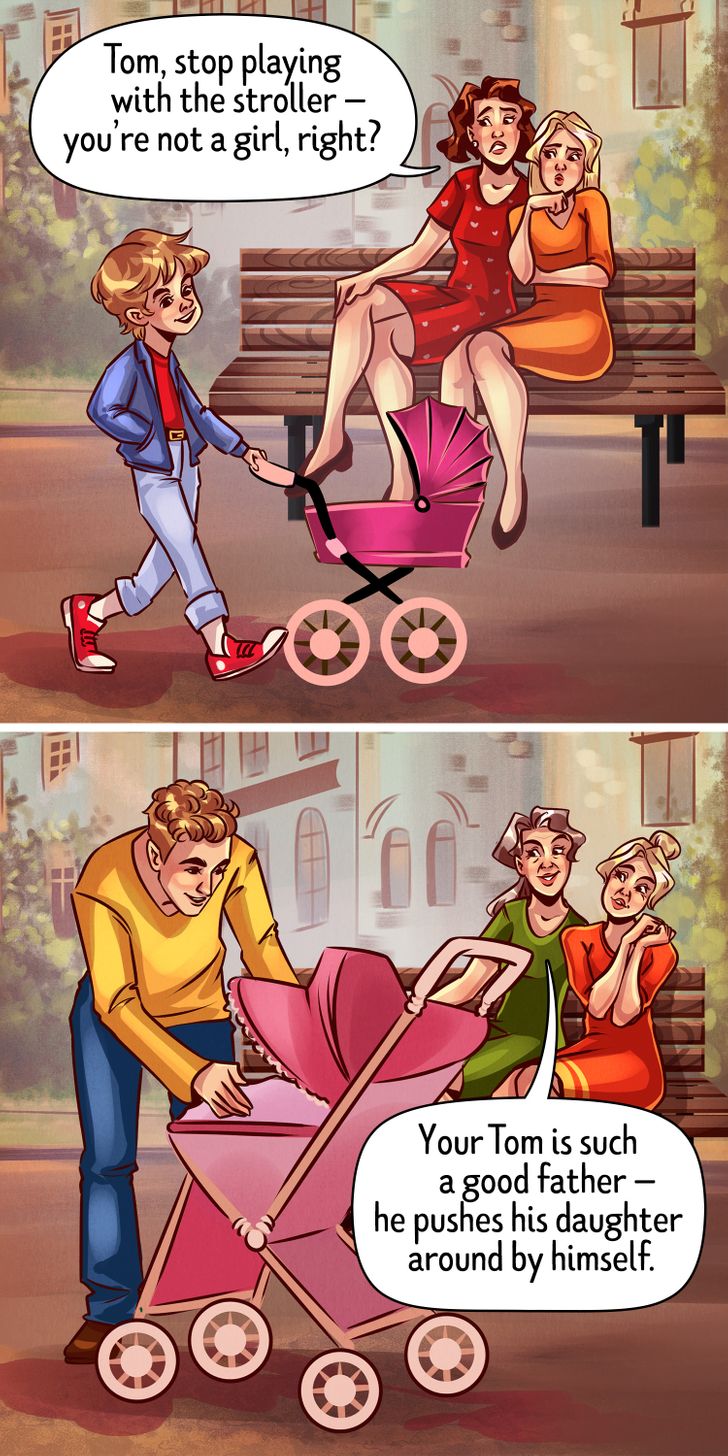
Many children are banned from certain things and behaviors due to gender stereotypes. Boys are traditionally not supposed to cry, show tenderness, or wear pink, while girls are not supposed to climb trees, play with cars, or play hockey. These restrictions prevent children from freely learning about the world around them and openly expressing their feelings.
What’s more, these phrases cause kids to form the wrong idea about each other. Boys grow up with a feeling that their female peers are somehow worse than they are because “it’s shameful to behave like a girl.” Girls, in their turn, feel that all boys are aggressive hooligans that they’d better stay away from. This causes problems in relationships with the opposite sex for both parties.
- “You are a girl!” is the phrase that takes first place among my mom’s favorite sayings. I can’t shout, I can’t fight, and I can’t turn off a potential boyfriend she has found for me. © Mnogolikaya / Yandex Zen
Which phrases from your parents affected your life most of all? Have you managed to avoid negative guidelines while raising your own kids or do you often realize that you are making the same mistakes?
Comments
My best friend's mother never lets her do anything because in her opinion she is the one who can everything the best. My friend is literally helpless 😥
These parents need to chill they just kids!
Without awareness we will continue to pass these awful attitudes down generations. Everyone should have opportunity for psychoanalysis.
When my Patente separated and dad moved out, I had to to sleep together with my mom in the same bed. Even though de had 2 bedrooms until I was19 and sie finaly met her exboyfriend and he moved in. Even when my were still together we slept together in one bed.
Related Reads
11 Harsh Truths Almost All of Us Tend to Neglect

10 Tips to Keep Your Child From Developing Body Image Issues
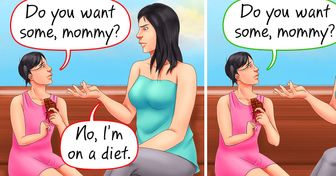
People Who Are Happily Married Share Their Advice for Maintaining a Relationship
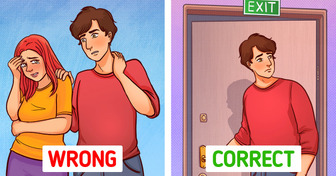
12 Weddings That Uncovered Shocking Secrets and Scandals
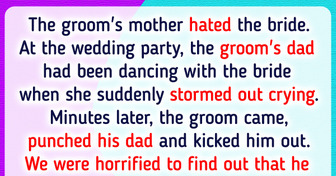
12 Kids Placed Their Parents in Situations They’ve Never Been in Before
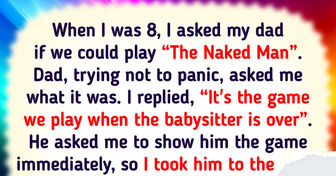
13 Phrases Parents Use That Can Push a Kid to Seek Therapy in the Future
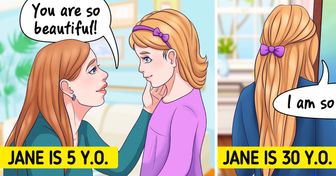
8 Ways to Heal From Toxic Parents
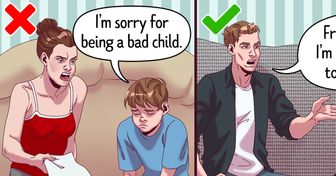
11 Safety Tips All Women Should Know Inside Out

16 Couples Who Are So Different They’re Living Proof That Opposites Attract
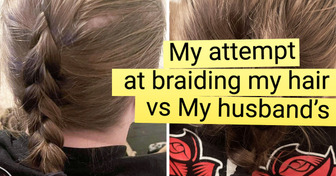
My Parents Wanted a ‘Family Vacation’ on My Budget—I Made One Move They Didn’t Expect
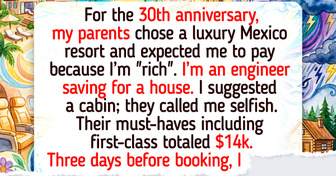
I Refuse to Earn Less Just Because I’m Getting Older
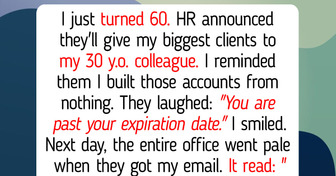
14 Times Reality Proved to Be a Better Screenwriter Than Hollywood Could Ever Be
